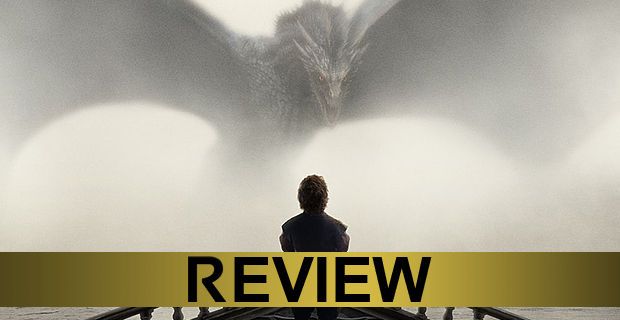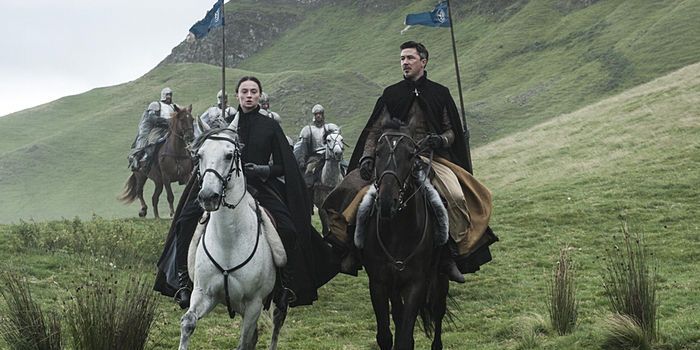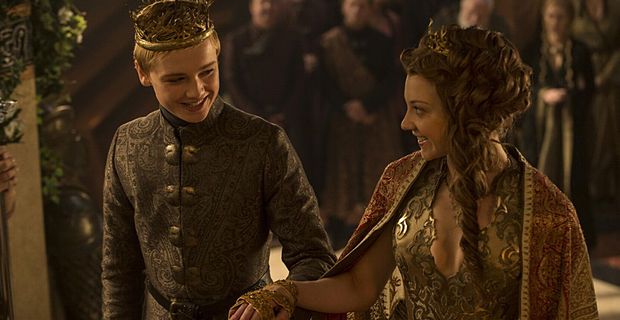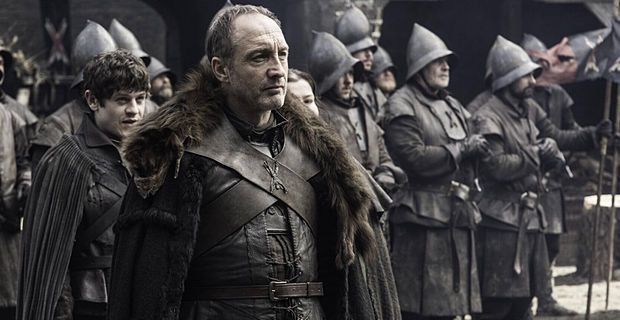[This is a review of Game of Thrones season 5, episode 3. There will be SPOILERS.]
-
Last week, Game of Thrones made "justice" the name of the game. Unsurprisingly, that term proved difficult to express, much less achieve. The word seemed destined to be an unfulfilled promise in the increasingly complicated world the series inhabits. After Daenerys took to a public forum to demonstrate her devotion to the concept, and was immediately rebuked by the people she claimed to have saved, it was clear that the definition of justice wasn't a matter easily agreed upon. As such, 'High Sparrow' finds itself lowering expectations somewhat by wading around in the murkier, less idealistic, and yet far more personal waters of vengeance.
Vengeance is a term that, despite meaning something very different to everyone in a specific sense, its essence is more easily agreed upon: the act of hurting someone else because that person (or persons, if you're Arya Stark) hurt you. It's simple retribution; it doesn't adhere to a social construct of doing the greater good for society at large. Instead, it's a one-on-one exchange fueled by a person's baser instincts and the need to balance the scales. And even though it's different for the individuals doling out retribution in various forms, his or her actions probably feel a lot like justice.
And it's that distinction, the subtle shift away from the grand scale of Dany's troubled rule/occupation of Meereen, to the smaller, but no less troublesome aspects of Jon Snow's nascent leadership of the Night's Watch (which is put to the test by his very public execution of Janos Slynt), and the various vengeance-focused components that make 'High Sparrow' an equally successful, and yet more personal outing for all the characters involved.
There's no Dany this time around, and maybe that's for the best. With all the thinly veiled mudslinging going on between Margaery and Cersei in King's Landing, the conflicting circumstances and tone of Dany's thread would have stuck out like a dragon in a goatherd. Besides, the fabricated post-nuptial bliss that Margaery delivers to her new husband Tommen is far more suited to the episode's thematic core of wrong's being righted on a personal level. That's not to say Margaery has any such quibble with the boy king. Like his misreading of the soundtrack to the consummation of their marriage, naïve little Tommen only thinks himself capable of eliciting some kind of reaction. Instead, he's just a pawn in his wife and his mother's game. A single reason among many for Cersei to look with an eye towards vengeance – for both the verbal slights handed down by the smirking usurper, and the role Cersei believes Margaery plays in the prophecy handed down by the witch in the season premiere.
But unlike the many players who are currently on the board, Cersei seemingly has more to lose, and as such, her path to vengeance must be more circuitous than, say, Arya or Brienne's. Because her situation is so tenuous, and the slightest miscalculation could upset the fragile power the Lannister name still holds, Cersei must play the long game. And it's one she has demonstrated a willingness to do, as we saw last week, when titles were distributed from the Hand's chair like a dealer throwing out cards during poker night at King's Landing. It's also why Cersei sees the so-called High Sparrow (Jonathan Pryce) as yet another piece on her board, rather than the grave threat the High Septon believes him to be.
Where 'High Sparrow' finds its narrative core isn't in the titular religious leader, however, but in the stories of three women: Arya, Brienne, and Sansa. All three have reason to want vengeance against those who have wronged them, but only one of them is making it her life's mission. At the end of 'The House of Black and White,' Arya was ambiguously ushered through the color-coded doors by Jaqen H'ghar. When this episode opens up, Arya's inside the place she wants to be, but finds she's no closer to an answer as to what she's actually doing there, than when she was lopping the head off a pigeon in a Braavosi alleyway.
Sweeping the same floor for days, watching as some guy ritualistically kills himself by drinking from a pool of water in the main hall, and unwittingly playing the "game of faces" with switch-wielding young woman, it seems like Arya's being Mr. Miyagi-ed by Jaqen, who suggests his would-be apprentice might be closer to becoming "no one" if she tossed all of Arya Stark's things into the drink. The sense of ritual becomes prevalent once more, as Arya's disposal of her belongings implies she's ready to become one of the Faceless Men. But her reluctance to toss Needle along with everything else underlines the paradox of Arya's situation: her quest for vengeance is utterly personal; it cannot be undertaken as "no one," but it cannot be accomplished without first becoming just that.
Along with the notion of vengeance, there is an overwhelming sense of conversion in 'High Sparrow' that signifies turning points in the stories of characters who have otherwise been in a holding pattern. Along with Cersei taking the reigns with regard to fortifying herself against her own prophecy, and Arya and Jon taking the first steps toward responsibility in their new roles, Sansa and Brienne both open themselves up to the prospect of doing what they'd perhaps never considered before. While Sansa understands that her arranged marriage to Ramsay Bolton and his crazy eyes means she will, in a weird way that only Petyr Baelish can sell, be taking a proactive role in her own life, Brienne explains to Podrick why she has such a thirst for vengeance against Stannis.
In a way, the weight on Brienne and Arya's shoulders is the same: neither was able to protect their loved ones, and both actors do a phenomenal job conveying that sentiment through their verbal and nonverbal performances. The episode may be focused thematically on the notion of vengeance, but its greatest success lies in how it depicts the way retribution as a primary motivator fundamentally changes a person from a "bystander to tragedy" to someone willing to act.
Although you might not call it a quest for vengeance, there's a hint of that in Tyrion and Varys' misadventures on the road to Meereen. Neither man is willing to be a bystander any longer; they're taking action – even if that means doing some day drinking in a Volantis brothel so Tyrion can discover he no longer has the same appetites as before. But some men who were born to action still answer to their old masters, like the disgraced Jorah Mormont who kidnaps Tyrion for reasons we all can likely assume. It not only shows how desperate Jorah has become, but it also sets the stage for yet another slight just waiting to be avenged.
-
Game of Thrones continues next Sunday with 'The Sons of the Harpy' @9pm on HBO.
Photos: Helen Sloan/HBO





